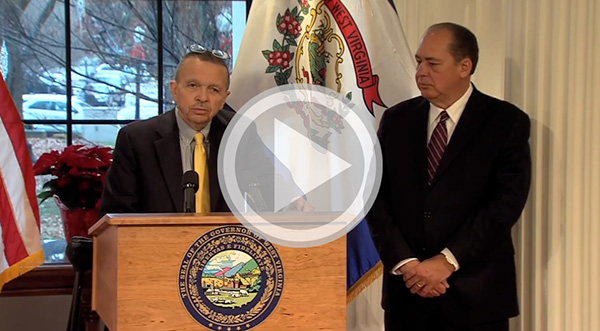- Details
According to the latest report from the Energy Information Agency (EIA), coal production in the United States rose by 1.8 million tons for the week ending December 13, compared to the same time last year. Production for the week stood at 19.8 million tons compared to 18 million tons in 2013. Year-to-date, production was also up slightly, to 944.6 million tons from 939 million tons in 2013.
This increase was reflected in the number of rail car loadings, which saw an increase of 7.5% for the week over the same period last year. Rail car loadings were also up 0.2% year-to-date.
- Details
In another attack on coal and other traditional fuels, the Obama White House is now calling on federal agencies to consider the climate-change impact of a wide range of energy projects that require government approval.
The draft guidelines, released Thursday by the White House’s Council on Environmental Quality, are likely to affect fossil-fuel projects the most, such as pipelines, terminals that export coal and liquefied natural gas, and production of oil, natural gas and coal on public lands.
- Details
West Virginia Coal Association files comments on the proposed rule
The West Virginia Coal Association joined Governor Earl Ray Tomblin and representatives of Appalachian Power and First Energy at a news conference Monday announcing their filing of comments related to the EPA's proposed carbon pollution emission guidelines for existing power plants - also known as the "Clean Power Plan." Monday was the last day to submit public comments on this latest job-killing regulation by the agency. WVCA President Bill Raney joined Tomblin and Appalachian Power President and COO Charles Patton in condemning the new regulation.
"This poorly devised, and we believe, illegal, power grab by the Obama EPA will hurt West Virginians by minimizing the use of West Virginia coal and force the closure of more coal-fired power plants across the country," Bill Raney, president of the West Virginia Coal Association said. "It will further reduce the number of West Virginians working in the coal and power generation industries, taking paychecks out of our communities and further jeopardizing our state's economic prosperity. EPA is literally attempting to take control of the nation's electricity grid and the state's sovereign authority with these proposed rules".
"We certainly need our congressional representatives - Senator Manchin, Senator-elect Capito, Congressman McKinley, Congressmen-elect Mooney and Jenkins - to push the new Congress to do whatever they can to stop this job-killing, economy-smashing plan in its tracks. It makes no sense that EPA is inflicting the pain of taking our great coal miners' jobs for a CO2 reduction of less than 1% and this attempt to wrestle regulatory control away from the states will result in higher electric bills for most Americans," Raney said.
A recent study by Energy Ventures Analysis found that under these proposed rules, the annual West Virginia household electricity and gas bills will increase by $750 - a 38 percent increase - by 2020.
"President Obama is mandating a move away from low cost, coal-fired electricity to more expensive alternatives for an initiative that will have little to no impact on global climate change," Raney said. "When you take into account that more than 400 electric generating units across the country are slated for closure or transition to alternative fuels in the coming years, these rules also severely threaten the stability of America's power grid."
Raney offered that 58 coal-fired electric generating units across the country that currently use West Virginia coal will be shuttered by 2020. This represents the livelihood of thousands of state residents.
Over the past several months, more than 12,000 individuals have signed a West Virginia Coal Association petition in opposition to the EPA's "Clean Power Plan". All those signed petitions were mailed to EPA on Monday. The Association's comments can be viewed online at the organization's website at:
http://www.wvcoal.com/latest/wvca-comments-on-epa-hq-oar-2013-0602.html
- Details
United States Environmental Protection Agency
Carbon Pollution Emission Guidelines for Existing Stationary Sources: Electric Utility Generating Units; Proposed Rule, 79 Fed. Reg. 34,830 (June 18, 2014).
EPA—HQ-OAR-2013-0602
- Details
West Virginia Coal Association files comments on the proposed rule
Charleston, WV (December 1, 2014) – The West Virginia Coal Association condemned the EPA’s proposed carbon emission guidelines for existing power plants – also known as the “Clean Power Plan” in comments filed with the agency today.
“This ill-conceived, poorly devised and illegal power grab by the Obama EPA will hurt West Virginians by minimizing the use of West Virginia coal and force the closure of more coal-fired power plants across the country,” Bill Raney, president of the West Virginia Coal Association said. “It will further reduce the number of West Virginians working in the coal and power generation industries, taking paychecks out of our communities and further jeopardizing our state’s economic prosperity.”
“It will extend up and down through the supply chain to include direct and indirect jobs, impacting every sector of our economy from the mine repair shop to the railroads and from the local pizza place to the school system.” Raney stated, “We need our congressional representatives – Senator Manchin, Senator-elect Capito, Congressman McKinley, Congressmen-elect Mooney and Jenkins – to push the new Congress to do whatever they can to stop this job-killing, economy-smashing plan in its tracks.”
- Details
Association Says Costs Simply Not Bearable for West Virginia Families
CHARLESTON — The EPA’s continued assault on coal and coal-fired power plants comes with a huge cost to consumers. According to a recently released study, the resulting shift to using more natural gas will likely cost the average family an additional $750 to $850 per year for energy use in 2020 compared to what they paid in 2012.
The study, “Energy Market Impacts of Recent Federal Regulations on the Electric Power Sector,” factors in the EPA’s proposed carbon rule and other regulations, along with the expected doubling in price of wholesale natural gas in coming years. The yearly energy cost for the average Ohioan would go from $2,022 in 2012 to $2,874 in 2020, a 42 percent increase, the study projects. For West Virginians, the yearly energy cost would go from $1,960 in 2012 to $2,710 in 2020, a 38 percent increase, the study projects. Meanwhile, nationwide, consumers and businesses would see the cost of electricity and natural gas increase by nearly $300 billion in 2020 compared with 2012. The industrial sector will be hard hit with total electricity and natural gas cost for the sector approaching $200 billion in 2020, almost double the cost from 2012. This would stifle industrial growth and lead to higher prices for any goods produced using electricity. Overall, the study projects a $177 billion increase in electricity costs and a $107 billion increase in natural gas costs in 2020 compared with 2012 when the cumulative effects of EPA regulations and energy market impacts are analyzed.
- Details
WVCA Offices will be closed on these two days for the Thanksgiving Holiday.
Thank you and have a wonderful holiday.
- Details
The West Virginia Department of Environmental Protection (WV DEP) has decided not to file an emergency rule to implement the provisions of Senate Bill 373, the Aboveground Storage Tank Act that was passed by the Legislature following the Elk River Chemical Spill in January. The agency will modify the currently proposed emergency rule and file it as a “normal” rule for consideration by the Legislature during the 2015 Regular Session. Once filed as a normal rule, there will be another public comment period and public hearing held on the proposal. If filed as an emergency rule, the regulations would become effective upon certification by the Secretary of State and be operative as the Legislature considers revisions to the statute. WV DEP’s interpretive rule http://www.dep.wv.gov/WWE/abovegroundstoragetanks/Documents/20141020DRAFTInterpretiveRuleRevBasedonCommentsKABfinal.pdf will be the only effective rule while the Legislature considers revisions to Senate Bill 373.
- Details
Congressman David McKinley (R-WV), will have more responsibility when the new Congress begins meeting next year. McKinley, who was re-elected to his third term, will continue to serve on the House Energy and Commerce Committee for the next two years. He will also maintain his position on the Energy and Power and the Environmental and Economy subcommittees, but has been named vice chairman of the Subcommittee on Oversight and Investigations. While on the committees, McKinley has been vocal in his opposition of the Environmental Protection Agency and the Affordable Care Act.







